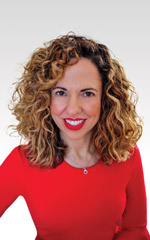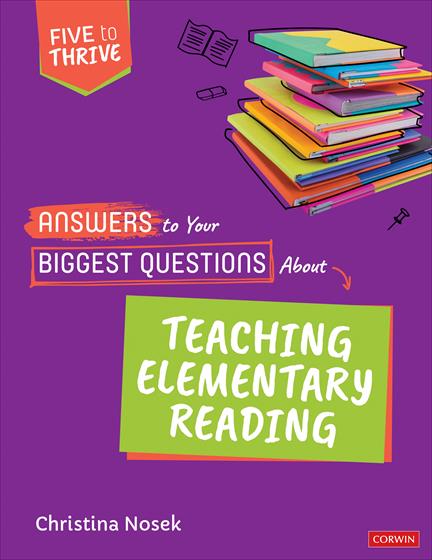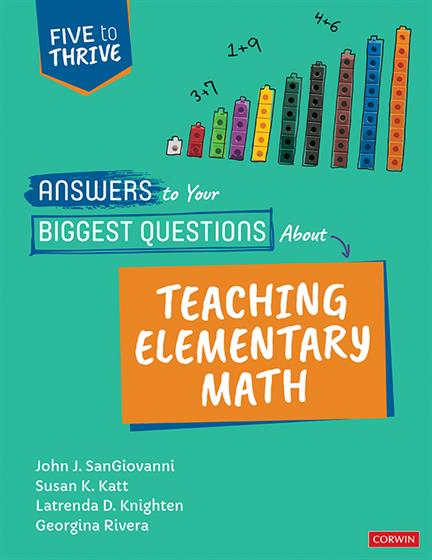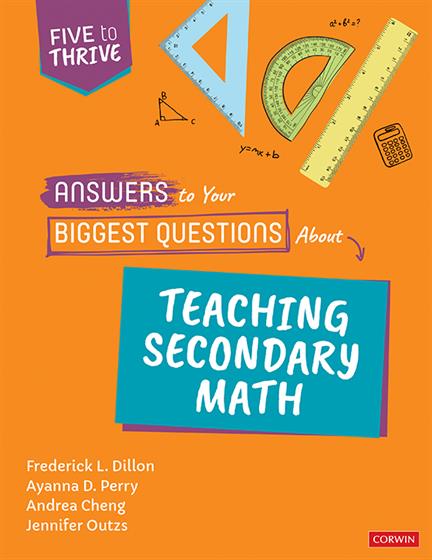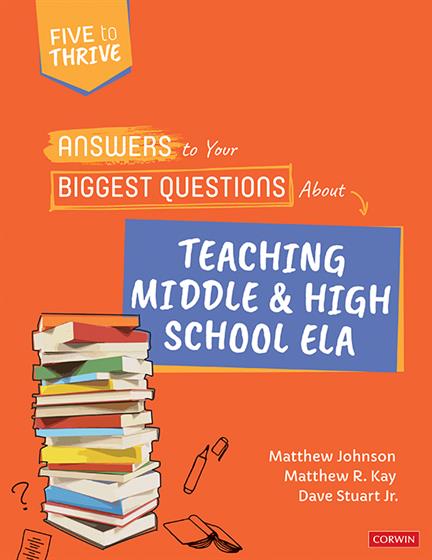Series 3 Leaders Coaching Leaders Podcast
[00:00:00.85] SPEAKER: Welcome to Corwin's Leaders Coaching Leaders podcast
with host Peter DeWitt. This podcast is from education leaders for education
leaders. Every week, Peter and our guests get together to share ideas, put
research into practice, and ensure every student is learning not by chance, but
by design.
[00:00:19.59] PETER DEWITT: Hi, Tanya. How are you?
[00:00:21.00] TANYA GHANS: I'm good. I'm excited about today's session. So
often we're speaking to leaders naturally. But today, we get the chance to
speak to some teachers.
[00:00:34.58] PETER DEWITT: Sorry, I was like so excited to jump in. Yeah, I
think one of the things there that I almost feel like I want to say time out to
those leaders who feel like, oh, this isn't going to be about me because it's
about teachers. I want to say time out, it's all about you.
[00:00:48.86] TANYA GHANS: Exactly. I was thinking if you ever wanted to be
a fly on the wall on the wall as a leader, and I'm sure you have, and listening
to what your teachers are thinking and you really want to know, this is the
session to give you a little bit of that experience. So definitely stay tuned.
And we have four fabulous teachers who are authors themselves. For a Five to
Thrive series, fantastic practical books for ELA and math.
[00:01:15.77] So we get to hear about their wealth of knowledge on those
topics a bit. But again, we also merge it with, hey, leaders, what do we also
want you to know about the work that we're doing on the ground.
[00:01:27.65] PETER DEWITT: Yeah, so they need to get ready to listen to
Ayanna Perry, Georgina Rivera, Christina Nosek, and Matthew Kay because I think
it's a fantastic conversation.
[00:01:38.12] TANYA GHANS: Agreed. Happy listening.
[00:01:41.07] [MUSIC PLAYING]
[00:01:44.38] PETER DEWITT: Welcome to the Leaders Coaching Leaders podcast.
[00:01:47.94] GEORGINA RIVERA: Good morning. Thank you, Peter.
[00:01:49.71] MATTHEW KAY: Thanks for having me.
[00:01:50.95] AYANNA PERRY: Hi, good morning.
[00:01:52.47] PETER DEWITT: So it's really good to have you on here. And
we've got these two really important topics. They've obviously been in
educational discussions for a really long time. And I think when I'm thinking
about both ELA and math, I do a lot of work and a lot of research around
self-efficacy, the confidence we have in our own actions. And I feel like both
your topics, ELA and math, are the ones that people seem to feel less
efficacious.
[00:02:25.53] We've all heard about mathphobia and that kind of-- those kind
of things. So how about we start with Ayanna. What is it that you focus on with
teachers in your role when it comes to your focus on secondary?
[00:02:44.13] AYANNA PERRY: Yeah, in the work that we do with teachers, one
of the things we try to help them do is study their own practice. So we engage
our teachers in inquiry. And that offers two benefits. The first is when you're
studying your own practice, you're able to see what positive things you're
doing with your students. And so it's not the critical voice that you have in
your head that reminds you often of the other work you need to do. But you're
able to really see how you're supporting them.
[00:03:12.34] I think the other is that you really lean into the
professional aspects of your work. As a professional, you study, you learn, you
read, you research. And inquiry really allows you to engage in that kind of
work as well with your colleagues. So that you all are learning together how to
best support your students.
[00:03:29.64] PETER DEWITT: I like that. The inquiry approach. Just that's a
great trend that we see happening more and more. So that's wonderful. Georgina,
you're in the elementary world. So what does this mean for you? What kind of
topics do you focus on with teachers?
[00:03:47.23] GEORGINA RIVERA: So I'm so happy you asked me about this
because we're actually doing a school-wide initiative focused on what we call
is math identity, which is do students see themselves as doers of math. And
what we're noticing is the identity work that we're doing within our school is
paying off in terms of students engaging in a way that we've never seen them
engage before.
[00:04:08.31] So what does that look like? Because a lot of people ask me,
what does that look like? A lot of it is first you need to have students even
talk about their identity. Do I see myself as a doer of math or not? And then
we're empowering them, Peter, to take leadership roles within our classroom.
[00:04:24.46] So if I was to take you through my school, you're going to see
students as math coaches. You're going to see teachers really spending the time
to get to know students' strengths versus their deficits. So we're really
looking at that. And we're actually naming them as mathematicians. And it's
made a huge difference in the culture of our math classrooms.
[00:04:44.07] They're leading the learning. They're showing us their
thinking. We're letting them use multiple representations. And so there's a lot
to be studied around math identity. A lot of work has started in the math
world. But the implementation side, I think is critical. And I think it's going
to pay off when they get to high school and Ayanna sees them.
[00:05:03.54] Because if they can see themselves as doers of math-- because
you know what people say, like I'm not a math person. I'm not a math person.
But when we empower them and say, I'm not only a mathematician, I'm a math
coach, it totally changes the way that they behave in the classroom. They
engage in tasks faster. And we're seeing higher student outcomes.
[00:05:23.97] Even students that are multilingual, students that typically
didn't engage in the classroom, we're seeing higher rates of just student
efficacy. So I think that's really critical as we move forward in education.
[00:05:36.78] PETER DEWITT: Yeah, as one of those people that actually grew
up thinking-- or being told they weren't a math person, I certainly wish I had
both of you to help me with my approach. Christina, we're going to start--
we're going to move onto you because you look at elementary reading. And I'm a
former first grade teacher, so this is in my wheelhouse. I'm actually really
happy about that. I taught elementary school for 11 years.
[00:06:00.63] I think people just assume that teaching reading is easy. Just
open up a book, can sound out some words, we're good to go. And as somebody who
taught first grade for 7 out of 11 years, it's just not that easy. So how do
you help people understand what it's like to teach reading in the first place?
And how do you help them get past so we can-- because we know that one of the
things that happens at the elementary world is that not everybody who's
supposed to teach reading really has a huge background in reading. They might
not have a degree in reading either. So how do you help that?
[00:06:37.90] CHRISTINA NOSEK: Sure, that is such a great question. So much
of teaching reading, and I think a lot of people don't really understand this
quite yet, is really building that community for students and building that
community for students to feel safe, to feel seen, to feel like they can take
risks in their reading. It's so much more than teaching decoding, so much more
than teaching comprehension.
[00:07:03.85] It's really setting up the systems, the procedures, the
environment for students to see themselves as readers if they don't quite see
themselves as readers yet. So working to get to know students, their likes,
their dislikes, their past experiences with reading. Their past experiences
with reading really form who they are.
[00:07:27.77] And so much of teaching elementary school is not just knowing
our subject, but knowing our students, knowing how they view themselves, their
culture, their language, and not just knowing that, but celebrating that and
bringing that into the classroom as well. And I think that's a part of teaching
reading, really and writing that a lot of people don't first think about when
they first come into education.
[00:07:56.70] PETER DEWITT: Yeah, that's great. Matthew, there's sort of
this myth, and maybe it's a reality as well, that as our students go from grade
level to grade level, and they go up into secondary, middle school, high
school, they kind of lose their passion for reading. So how does your work in
secondary ELA help with that help? Help bring back that passion with literacy?
[00:08:21.57] MATTHEW KAY: Thanks for having me. There are a couple of ways.
I think some of the things that are more obvious, not easy, but obvious, would
be finding spaces for more choice for kids to kind of read the things they want
to read in class. I'm not a proponent of like things being 100% choice. Some
people are. And I respect that.
[00:08:45.63] I also think that sometimes it's good to have-- to build
community around a shared text that everyone is reading. And finding a balance
that makes sense for kids there makes sense so kids can pursue their own
passions and read about the things they're interested in and also build
community around the book and try to make sense of something together.
[00:09:05.35] And the other thing that it comes immediately to mind was just
re-engaging kids as writers because those things are connected. A part of
appreciating cool things in literature and reading is the opportunity to use
them as mentor texts and create cool pieces of literature. And the more you see
yourself as a writer, the more you see yourself as a reader. And a lot of
times, we overcompartmentalize that. And all of a sudden, the kids, they just
see themselves just as consumers.
[00:09:36.70] And I think that will work for some kids. But for most of us,
I would argue that those two things are connected. And the more you ask them to
write about cool things and then look to see how other writers wrote about cool
things, the more they're going to want to read about cool things. And I think
that that's a bit of a cycle. But the more we divorce those things, the less
we're playing on what would naturally interest kids. And then we are reduced to
gimmicks.
[00:10:06.03] And one of the things we tried to write about was not an
overreliance on gimmicks to get kids' attention, but actually letting the
things that would naturally interest kids be the engines that drive us.
[00:10:21.19] PETER DEWITT: Yeah, it's-- we're all like-- our heads are
bouncing up and down shaking yes every time you're saying something. I want to
ask a follow-up for you and for Christina specifically as well. There's a lot
of-- I write a blog for education we called Finding Common Ground. And one of
the things that I've been exploring a lot lately is the fact that books are
being banned around the country.
[00:10:46.67] And as-- and I'll start with the two of you because you're the
ELA people. So there's a natural fit. But what are your thoughts on this whole
idea that we're banning books, which is the very thing we shouldn't be doing?
We shouldn't be banning conversations. We should be engaging in them. But what
are your thoughts on this whole thing that's happening politically across the
country, because it is impacting schools? How do you help educators with that
part?
[00:11:15.98] MATTHEW KAY: Well, part of it is taking some of the pressure
off of educators to solve everything. This book banning thing is a political
problem. It's not an education problem. And I think sometimes when you put the
pressure on us to be like-- to solve that when that's happening in
legislatures. That's happening because people don't vote. That's happening when
people's votes are suppressed. That's happening-- that is outside of our
classrooms, if that makes sense.
[00:11:43.43] And sometimes we have to watch our rhetoric to-- when we make
teachers responsible for solving situations like this, that's a little-- it's
too much. We are-- our job is hard enough. We don't need that extra layer of
responsibility. What we do have responsibility for is whenever we get the
opportunity to engage these ideas, to do it right and to do it in ways where we
don't-- where we're not constantly fighting unnecessary fights that happen
because of our poor execution, or our sloppiness, or things like that.
[00:12:16.76] If we're going to be reading a book that we know is going to
be something that's going to need to be defended, we have to do it well. And we
have to do it without-- we can't be lesson in planning in the Notes app before
class when we're reading a banned book. You know what I mean? We can't be
teaching someone else's lessons-- a lesson plan we found on teacher pay
teachers or somewhere else without having a full knowledge of what we're doing.
[00:12:44.63] We have to be-- we have to bring our A-game all the time. But
we especially have to bring our a-game when we are going to be asking our
administrators to be defending us. We have to make sure that our classrooms are
worth defending because everything we've done is thoughtful. And everything
we've done is careful and with the students at the center.
[00:13:04.04] Outside of-- that's my passion. And that's my-- it's been my
passion for years, as long as I've been working with schools. I just want to
make sure teachers are doing things the right way. Outside of that, I'm a big
on taking pressure off of teachers because that's not us. We did not do that.
[00:13:19.85] We are the ones-- that is for-- that is stuff that's happening
in the halls of state legislatures and Congress. And those are voting issues
that are outside of our-- that's outside of our locus of control. So we just
have to watch our rhetoric because teachers are the first people that everyone
goes to fix everything.
[00:13:42.83] PETER DEWITT: I mean. And I agree with you, it's just the
problem is it's definitely impacting teachers at the same time. Christina, what
about? What about you? I see you shaking your head and agreeing here.
[00:13:52.31] CHRISTINA NOSEK: Oh, everything Matt said completely resonated
with me. And I think something Matt touched on, which is incredibly important,
is that we have to be thoughtful. We have to be planned. We have to be really
intentional with the decisions we make, the books we bring to our classroom.
[00:14:08.51] And it's interesting, this actually-- not banning of books,
but questioning of books, strong questioning of books actually happened to me
and my teaching team this year. But prior to reading these two books that we
knew were politically challenged, we went to my principal and said, hey, we're
reading these books. We'd like you to know these books as well.
[00:14:33.59] And she did. She supported us. It was great. So I think also
keeping administrators in the know, sometimes educating your administrators.
Because administrators oversee the whole school. They don't books as intimately
as reading teachers do. That was a huge help for us.
[00:14:55.12] And you know, just one last thing on banning books. Banning
books really is-- it's like Matt said, it's a political thing. But it's also--
it's banning children's and families' humanity. And it's just not acceptable.
So it's something that it's infuriating. And at the same time, we have to work
through it and fight it, but yet in such a professional way and focus on the kids.
I think that's the big thing. We have to focus on the kids and ask ourselves
what's best for the children in front of us not what's going on outside these
walls per se.
[00:15:35.59] PETER DEWITT: No, it does. And I think this leads the segue.
And I really like what you both touched on, too. Because it's about the
administrator's role. I mean, for this podcast, we know that we've got teachers
that listen. But it's a Leaders Coaching Leaders podcast. I think both of you
offered some really great suggestions where that's concerned.
[00:15:51.43] I'd like to turn it over to Ayanna. When you're focusing on
secondary math, what do you want school leaders to think about and know when it
comes to secondary math? Because one of the things that I hear quite often from
teachers, or from instructional coaches, is that there are teachers that will
say, my administrator doesn't support me. So what is it you want, in your wood,
what is it you want school administrators, school leaders to know about
secondary math and their role in it?
[00:16:25.75] AYANNA PERRY: Yeah, this is an interesting question. I think
there's, a lot of times, what feels like a divide between administrators and
teachers when we forget that teachers want to do the best for their students.
And administrators want to do the best for their teachers. But we have
different grain sizes or balconies, if you will.
[00:16:49.25] And so the thing that a teacher is thinking about is on a
particular balcony. The thing that the administrator is thinking about is on a
slightly higher balcony. And if we don't come to the middle and talk about our
passions, and what we really care about, and how we want to best serve the
students, then it will feel like competition when it really should be a more
collaborative relationship.
[00:17:09.04] So I'll say this, around mathematics, right now at work, we're
reading Citizen Math. And it's a book about how to bring math to real problems.
Should airplanes be oversold and then the math behind that. And why we do it,
and what the percentage of flights are that are canceled, like all the things
that mathematics could really help students make sense of and understand about
insurance, about vaccinations.
[00:17:36.30] There are all these things that are really useful for math to
be applied to. And I want administrators to know that when teachers try to
bring this into their classroom and get pushback, it really could be useful for
us to have a conversation, a lot like Christina said, have a conversation to
understand what we are working to do. We're working to bring honest and
mathematically supported conversations about the real world to our students.
[00:18:02.70] Not to persuade them, but to allow them to reason and think.
Every student everywhere who's ever said, when am I ever going to use? A math
teacher's go to is I'm teaching you to think critically. But teach me to think
critically around things that matter.
[00:18:18.09] I just was reading an article the other day, I think their
name is Kate Bellin has an entire curriculum on gerrymandering. Not so we can
convince kids about what's the right way to draw a boundary, but so that we can
help them think about when people are drawing boundaries, what this means for
our voting power.
[00:18:37.17] So I do really want administrators, and even teachers, to
really think about what are you helping your students think critically about.
When parents are pushing back, are you hearing the need, not the criticism?
What are parents needing and wanting their students to be able to do? And how
can you support both-- all stakeholders in this because.
[00:18:55.85] If you can do that well, if administrators can support
teachers and parents can be heard, then students benefit all around. And so I
think that's kind of the thing that I would bring to it is how do we work
collaboratively to support students to help families understand what our
intentions are. Everything is political. There's no thing in life that I can
think about that has no politics connected.
[00:19:18.66] So how do we best hear all voices so that our students can
reason and make the best decisions at their different levels? And your minds
change. Our minds change, the more information we get. So how do we help them
get enough information. So that when they're making up their mind, it's based
on data, statistics, they're able to make sense of the math. And they really
become critical thinkers and citizens who can use math to make sense of the
stuff that they're hearing. So I think that's what I'd say.
[00:19:48.32] PETER DEWITT: Those are such great examples. And once again,
I'm just going to say it, I wish that I had you as a math teacher or as a math
coach because those examples are exactly just-- those are real world examples
that we need to be able to explore. And we also know those are passion areas
for students.
[00:20:06.47] We want them to be engaged. We want them-- I was just looking
at a school district I'm working with that talks about building good
citizenship. And just what you're talking about was a fantastic example. So
thank you for that. Georgina, I'm going to ask you a little bit of a different
question, though, which is what are some ways that leaders can use the book,
your book, to improve mathematics Instruction.
[00:20:35.30] GEORGINA RIVERA: So that's one of the lenses that we actually
looked at when we were writing the book. Because I actually am a school leader.
Right now, I'm a site-based leader. And a lot of principals ask me, how do you
lead mathematics in your building. And what I say, and the way that we talk
about it in the book, is I really don't lead mathematic. I co-lead with my
teacher leaders.
[00:20:59.03] So what I want to say to principals out there is, number one,
if you want better math instruction where we're centering students-- I
apologize, I'm losing my voice a little bit-- then you need to be part of the
conversation. And you need to best practices in mathematics. So for example, I
meet with my math team, which is comprised of teachers, and coaches, and
interventionists once a week for one hour.
[00:21:21.35] During that one hour, we talk about best practices, which I
can pull from the book because they talk about best practices within
mathematics. We learn together as a team. Then we listen to teacher voice. And
if there's teacher leaders there that want to explore something deeper, like
for example, that math identity we talked about, that's a group within my
building.
[00:21:41.78] I don't lead that group. But that group is studying math
identity. And they're leading the work. And they're learning from each other.
So as principals, you need to empower your teacher leaders to help them teach
the other teachers in your building best practices.
[00:21:56.61] The other thing that I always say to my principals, and you
can use the book, is if you're going to want math-- if you want great math
instruction in your building, you need to know how to provide feedback that's
valuable. Well, what better way than to go a book-- go to a book and say, you
know what? Let me read about this. So I can engage in a meaningful conversation
where we're both learning side by side.
[00:22:16.85] Or I could even copy a few pages from the book and we could
sit together, which I say is better because it's not evaluative. It's like, how
can we learn about this together. And say, how do we do this better in our math
classroom? So those are just a few ways, empowering teachers, making sure that
you're the lead learner in mathematics. And you know as much as your math coach
does. Or you're working towards that, and then utilizing the book to learn
alongside your teachers.
[00:22:41.90] Because it's really critical that principals understand, when
I walk into a classroom, is there good math instruction here? And do I even
know what that looks like? And if I don't know, then I don't deserve to give
feedback. I don't deserve to say anything because that's not OK. But when I'm
the lead learner and I'm listening to my teachers, it totally changes.
[00:23:00.92] And the other piece is, if you're walking into classrooms, and
I'm sure Ayanna would agree with me, we've worked on this a lot, we're using
the book Building Thinking Classrooms, which is a Corwin book. And in that
book, it really decenters the teacher. And it centers students, which I know
Christina has talked about, and Matthew has talked about, and Ayanna has talked
about.
[00:23:20.33] No matter what subject area, students need to be the center of
whatever's happening. The lessons that you're planning in mathematics, the
books that we're reading in mathematics, the instruction, you should be seeing
kids talking, engaged in discourse. They should be doing the thinking. So if we
want all of that to happen, then we have to make sure as school leaders that
we're knowledgeable about that, empowering teachers to do that, and empowering
them to be leaders at the same time.
[00:23:46.76] PETER DEWITT: So you just did a couple of things there when
you said that. Number one, you highlighted the very reason why leaders need to
educate themselves on what to look for in classrooms, truly work with teachers
and students to understand what to look for in classrooms. And you also
highlighted the reason why many teachers are so frustrated by observations, and
walkthroughs, and learning walks because there are lots of leaders who go in
looking to check off a box.
[00:24:18.16] But they don't know what to look for when they go into
classrooms. And I think your books offer really great practical suggestions on
what leaders can look for. So as much as this is a book for teachers and we
want to buy your book for teachers, the reality is leaders can gain a lot of
insight from what you're offering because there is a stake in it.
[00:24:41.80] I'm a former school principal. I was a principal for eight
years. And I needed to read what teachers were reading too. So I could educate
myself on what to look for going into classrooms. So Georgina, thank you very
much for offering that. Because that was beautifully said. And it was
absolutely on point for why we do need to work collaboratively together, which
all of you have said already. So this is how we're going to end it. We're going
to end--
[00:25:06.40] GEORGINA RIVERA: Can I add one little thing here?
[00:25:08.59] PETER DEWITT: Of course.
[00:25:09.02] GEORGINA RIVERA: So I would just say, because I think all of
us have said it, the way we honor our students is the way principals should
honor teachers. It should be exactly the same. We need to listen to student
voice. Principals need to listen to teacher voice. I really want to make sure
that's resonating because that's what everybody is saying.
[00:25:26.89] All these teachers are saying, we just want to be seen and
heard. That's what students want too. If we could do that in education and
honor each other and have collaborative conversations where we're actually
engaged in meaningful conversation, it would be so much more humanizing. We
keep talking about making education humanizing. And that's really the point
here is we're all learning. I expect students to learn. Teachers are learning.
Then I better be learning. So all of that is tied together.
[00:25:53.11] PETER DEWITT: No, that's great. And actually, so I was going
to ask for, as we close down the podcast, what's one piece of insight, advice
that you would like to share. So that was yours. I think that was a-- that was
a great mic drop moment there for you.
[00:26:09.46] GEORGINA RIVERA: I appreciate that.
[00:26:11.32] PETER DEWITT: No, that's great. You did it before I could even
get to it. So I think that's awesome. That's the way it's supposed to work.
Christina, I'm going to go around my screen. And I'm going to ask you for
yours, and then Matthew, and then Ayanna. But Christina, what's yours? When
school leaders are hearing about the work that you're doing and the book, what
do you want them-- what do you want them to understand?
[00:26:34.26] CHRISTINA NOSEK: Building on something Gina said, I want
school leaders to-- I want school leaders to know that their teachers are
coming in from different entry points, and to support their teachers in
determining what those different entry points are, and then taking the next
step for themselves. Not everybody has the same entry point. For example, I'm a
20-year veteran teacher, written a couple of books now about reading education.
I have an advanced degree in literacy.
[00:27:02.80] The professional development I need is going to be very
different than Sarah my colleague down the hall where it's her first year of
teaching. So really looking at staff just in the way teachers look at students
and asking what's the-- what's the starting point for this teacher? How can I
help this teacher take their next step in growing as an educator? And it's
going to be different for all teachers.
[00:27:28.84] PETER DEWITT: That's absolutely great advice because you're
absolutely right. We make assumptions in our world, whether we're educators or
we're school leaders, we make assumptions that people know what we know. And we
can't make that assumption because that's what kills the rest of the
communication that we engage in. Matthew, I'm going to ask you to build on
that. When school leaders are reading your book, because I do think school
leaders need to read your book, what do you want them to take away?
[00:28:00.16] MATTHEW KAY: I'm not sure if they'll get this from my book, my
book-- what you will see is what I like so much about this project and the
whole series is that it's basically three teachers who've been around for a
while, sitting around, talking about stuff that works for them, which has
always been useful to me. Just sitting around with a bunch of colleagues who
are just saying, hey, this did not work. Never do this. Oh, this was great. Do
this every year. And just building.
[00:28:28.99] And so I'm glad that we created that. So try to create spaces
like that for the people that you are supposed to be leading and taking care
of. I think that's the biggest thing, the conversations that you see across
this Five to Thrive series. Try to create circumstances where those kind of
conversations can happen in your space, where folks can just sit and build. And
try to run interference for them as much as possible. So that they can just
build and sit and talk.
[00:28:55.75] The biggest I would say on top of that is this not in the book
for Edmunds, to be honest, is just don't buy the hype on shame being a useful
tool to drive teachers to success. I think I see so much misuse of shame,
shaming teachers, guilting teachers, making the teachers feel bad from
otherwise good people. I see administrators, and I'm like, you're not even this
person. Who told you you need to be this person?
[00:29:29.42] It's like telling a teacher don't smile till December. It's
like who told you that? Who told you to be that way? But I see that with-- they
walk in and the observations, just to build on what was said earlier, and it's
not only observations, not having the skill. But you clearly don't have the
skill base to give me to tell me anything.
[00:29:49.18] But even more than that, you come in with a gotcha attitude.
You come in with a checklist, oh, you don't have this. You don't have this. And
instead of explaining why, it's shame. And I see so much of that. Thankfully,
not in my space.
[00:30:02.68] But it's one of those things when I walk around, when I go to
different schools, when I speak to people throughout my district in Philly and
all sorts of places, I just see shame being overused. Even on issues of equity
and stuff like that, it's always like, bam, you're racist. Bam, you're this.
Bam, you're that, instead of conversations.
[00:30:21.22] And people go to shame when they're lost. People go to shame
because it's easy. You don't have to really-- you don't have to coach anyone
through someone if you think shame will do the trick for you. Shame is a bad
teacher. So I would tell every admin, the thing you think you're accomplishing
with shame, you are not accomplishing. It is not effective. And the second you
walk away, your teachers do not-- you have not helped the situation by doing
that.
[00:30:43.69] PETER DEWITT: Yeah, it also doesn't-- I mean, I think one of
the things you were talking about, research supports that collaborative space
for teachers to be able to talk. It's called collective teacher efficacy. And
it's absolutely important for teachers to have that space to be able to learn
together.
[00:30:56.21] And as far as shame, yeah, I think we've all worked for--
maybe you haven't, but I have, we've worked for our school leaders that can
actually shame us. And that doesn't build community, which all of you have
focused on in your book, the whole idea of building community when it comes to
math and literacy. But it also doesn't help build teacher voice and give
teachers the-- one of the administrative frustrations is when teachers always
say, just tell me what it is you want me to do.
[00:31:23.71] And my question is what brought them there in the first place?
What brought them to the place that that's the very question they're going to
ask? And you're talking about it right there as well, Matthew. So, Ayanna, I'm
going to actually end with you. What advice do you have for school leaders when
they are reading your book, what do they want-- or what do you want them to be
able to take away and be able to use what their teachers and students?
[00:31:48.80] AYANNA PERRY: Yeah, I'll say two things. The first is the
author group for the book that I wrote was me, I'm a secondary math and science
teacher coach. We had a pretty novice teacher. She had only been teaching for
like six or seven years as an author on our book as well. And then a veteran
middle school and a veteran high school teacher. I say that to say there is so
much passion, and intelligence, and excitement in teachers at all levels of
their teaching career.
[00:32:22.36] The first-year teacher has so many ideas, has such drive and
such passion to do such great work at school, as does the 30-year teacher, as
does the 15-year teacher who has different family responsibilities or different
volunteer things that they do. And so I think the first thing I'd say is find
that passion, provide space, like Matthew said, for teachers to be able to
connect around that passion, because it will drive such positive experiences in
your school.
[00:32:55.99] People will be excited to be there, even if I can only be
there until the bell because I got did stuff to do after the bell. When I'm
here if you provide me space to do some great work with some great people, we
won't have really negative feelings about our job and about our work. I think
the second thing that the book does is it provides some very just-in-time
resources for what critical lessons might look like.
[00:33:19.93] There's a lot of free data out there on pay scale. One of the
questions we had in the book was we showed how much money you can make with
what degrees you have. But then we compared it to how much money you make based
on gender. And how, oh, if I have this degree, shouldn't I be making this much?
But in fact, you can have that degree, and be of a different gender, and not
make that much.
[00:33:43.48] And then we don't even have these graphs for the range of
genders that we have in our world right now. And so really pushing the envelope
to think about how do we represent this data. How we help students make sense
of this data? I think that's the other thing I'd say.
[00:33:58.72] Administrators, let's help teachers do all these really
exciting things and creative things with our high school students. So that when
they get out in the world, the kinds of questions they ask is based in data.
They're able to push the envelope. And we have arguments, and conversations,
and passionate disagreements. But we come out of it smarter, more
compassionate, more thoughtful people. So I think that's the benefit of school.
And if we work together to get that done, I think it's good stuff.
[00:34:32.68] PETER DEWITT: No, it's-- I 100% agree with you there. It is
very good stuff because I think you focus on, in the right way, the things we
do need to be focusing on and give us so much to think about. So Ayanna,
Georgina, Christina, and Matthew, thank you for being a part of the Leaders
Coaching Leaders podcast, but also just for the Five to Thrive series in
general. It's definitely something that all school leaders and teachers should
definitely be reading and learning from. So thank you for being on the show.
[00:35:01.73] CHRISTINA NOSEK: Thank you.
[00:35:02.78] GEORGINA RIVERA: Thank you so much.
[00:35:04.05] MATTHEW KAY: Thanks.
[00:35:06.87] PETER DEWITT: All right, so Tanya, I have to admit, I really
loved that conversation. I felt like Ayanna started to talk about these real
important concepts that we need to be talking about that are not just
politically charged. They're actually real life things that are happening. And
she did it in such a beautiful way connected to math that I want to read the
book.
[00:35:31.59] And I know that's not what it's all about. But it just seems
like I would like to sit in her classroom and be one of her students. And then
Matthew offered so many nuggets of information and at the end, talked about
collective efficacy. And then we had Georgina, who, from a school leadership
perspective, just talking about the role of credibility, right?
[00:35:53.13] And I know that Christina was doing the same thing. They're
talking about that role of credibility, and doing walkthroughs, and learning
walks, and observations. And I think that is, for me, a key takeaway, the
credibility piece because I know that was important for you as well.
[00:36:08.52] TANYA GHANS: Yeah, I agree that just to add on to that, the
idea that people need to feel and trust that you've taken the time to really
get to know what it is that you're going to talk with them about. And that yes,
you may not be able to become deeply knowledgeable in all topics. It's not very
practical as a school leader.
[00:36:28.50] But there is a certain level that you're going to have to get
to with the work if you're really going to drive your teachers and your team.
And I do think this episode not just offered that wisdom but also the how-tos.
Again the Five to Thrive series is a great book that can help you get started
if you don't feel like you really have your arms wrapped around certain content
areas. So I love that.
[00:36:50.92] And I also just love-- not to end on a negative note at all,
but I did think one of the guests made a good point about how to be just so
careful about not using shame as a way to motivate people. And that again in
these particular times, that's always true-- but I think it can-- there's a lot
of fear around. It can be very easy for people to fall into that trap, even if
they don't mean to.
[00:37:15.42] I think our guest says it's not even really the personalities
of the leaders doing it. But it can happen. And that it's just-- I think it's
important for all of us to take a step back and think about what are our
intentions and where are we coming from before we speak to people. And just
make sure we're giving everybody the grace that we'd want to have ourselves.
[00:37:34.11] PETER DEWITT: Yeah, Matthew raised a really great point about
that because we don't want to make-- sometimes we make assumptions that-- and
we treat teachers like they're students. And that's-- and then we vilify people
who disagree with us. And that's never good. And from the credibility
standpoint, I remember reading Stone and Heen's book on Thanks For the Feedback.
And they talked about feedback triggers.
[00:37:57.45] And one of the triggers that resonated the most for me, it's
why I ended up writing instructional leadership, was the relationship trigger.
It's not that the feedback you give is unhelpful, or untrue, or not even
unneeded. But it's that they don't see you as a credible source to be the one
giving it to them. I love walking into these Leaders Coaching Leaders podcasts
because as much as I facilitate the discussion, I feel like I learn every single
time. And this was a prime example of that.
[00:38:27.93] TANYA GHANS: It's fantastic. I love this different angle we
took. I think we should have a twist every season. Maybe we'll bring on some
students and find out what they're thinking. Everyone, so glad you listened in.
And Peter, as always, I'm looking forward to learning with you next time.
[00:38:43.20] PETER DEWITT: All right, thank you, Tanya, always good to see
you. And then till next time.
[00:38:46.87] TANYA GHANS: Till next time.



